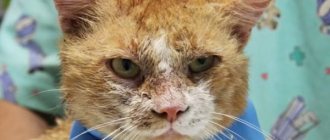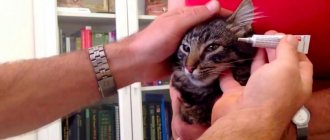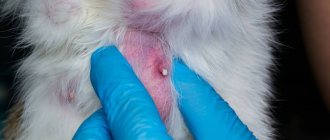What to do if roundworms ? Unfortunately, our little brothers have a huge number of diseases and there are far no fewer of them than people. There is only one problem: the pet is simply not able to say what hurts and in what place
. The only thing he is capable of is to send signals for help to the only one he trusts - the owner. The owner’s task is to recognize the symptoms and immediately contact a veterinarian for professional help and call him at home.
If you go to the clinic with a sick animal, especially a cat, on your own, then the anxiety and stress that she will experience will not turn out for the best. This puts cats at risk of developing the existing disease and developing new infections. After all, the immune system has weakened and is unable to defend itself. In particular, it is not able to protect itself from parasites, for example, roundworms - a common type of worms, which we will talk about in this article. Moreover, you should not carry out treatment yourself without consulting an expert.
Our veterinary center provides a veterinarian home call service. The final price will be announced immediately over the phone. The veterinarian will ask a number of questions, the answers to which will help him formulate an approximate diagnosis and the cause of the bad symptoms even during the departure. This means that upon arrival, he will prescribe the correct course of treatment much earlier, since the examination will take less time. In any disease, especially a parasitic one, time plays an important role, so if you notice any of the symptoms that will be discussed further, consult a doctor!
What are Roundworms in cats?
Separately hollow roundworms are called roundworms. Their sizes depend on age and gender. Typically, females are larger than males. Most often, parasites affect the gastrointestinal tract, but can cause damage to the pancreas and live in the bile ducts.
Can a cat have roundworms? This question interests many breeders. Any veterinarian will give an affirmative answer to this.
- Ascaris eggs are hatched from the body of the main host; they mature quickly, usually taking 4 days.
- After this, they become active for infection.
- Subsequently, they can enter the body of a furry pet directly or through contact with an intermediate host, which can be a rodent.
- At the stage of puberty, the parasite actively moves throughout the cat’s body.
- First it enters the gastrointestinal tract, from there it enters other organs, which it damages.
- The secondary entry of the pest into the digestive tract completes the cycle.
Are owners interested in what roundworms look like in cats? In size, they do not differ from worms that live in the organs of other mammals. Females reach 8-10 centimeters in length, males are more modest in size, they grow from 5 to 6 centimeters. Their bodies are colored light yellow.
Laboratory diagnostic methods
Diagnosis of toxocariasis is carried out by scatological examination of stool for the presence of parasite eggs. To make an accurate diagnosis and identify weak invasion, it is necessary to carry out three samplings. Tests are taken every 10 days. During this period, roundworms reach sexual maturity and begin to release eggs. To obtain an accurate result, tests are collected in the morning.
To exclude blockage of the biliary tract and intestines, the veterinarian prescribes additional examination methods - ultrasound or abdominal x-ray.
In some cases, the disease is detected without testing, when helminths are found in the cat’s vomit or feces.
Many veterinarians prefer not to waste time examining stool by prescribing preventive deworming for the animal. If the next day after taking anthelmintic drugs, dead Toxocara are found in the stool, then the diagnosis is confirmed.
When to contact a veterinarian
An unpleasant fact that especially upsets animal owners is the penetration of worms into the uterus of the future parent. If an adult is expecting offspring, then it is born infected. Another question that worries everyone is whether cat roundworms are transmitted to humans, are they dangerous for them?
- People can easily become intermediate hosts of the parasite at the larval stage, but adult invertebrates do not live in the human body.
- Larvae that have penetrated the child’s organs can affect the central nervous system, liver, organs of vision, lungs, and heart.
Coxocariasis can lead to complications and death of the baby. When contact between a person and a pet occurs, precautions should be taken.
Treatment of roundworm in cats should be the main measure to prevent infection in children. Teach the children to wash their hands. Protect them from close contact with a suspicious pet.
Possible complications
Treatment should always be completed, as otherwise the parasites can multiply again in the body. Worm attacks greatly weaken the body, so the following complications may occur:
- Everything that the cat eats while eating is not available to her. This is due to the fact that all nutrients are used to support the vital functions of parasites. Therefore, the pet will be sorely lacking proteins, vitamins and other nutrients. If the infection is not detected in a timely manner, it can even lead to death.
- If a huge accumulation of worms appears in the intestines, the passage may close completely. In this case, feces will not be able to come out, and then the intestine may even rupture.
- An infected cat's immunity is greatly reduced. Therefore, any pathologies become dangerous for her, including viruses and various infections.
- Roundworms release many toxic substances during their life. As a result, the metabolism in the fluffy's body is disrupted.
Causes and sources of infection
In a conversation on the topic raised, one cannot ignore the factors of infection, of which there are many:
- Soil contaminated with worm eggs;
- Unhealthy food;
- Houseware;
- Wool that is subject to licking;
- Contact between the animal and the intermediate host of the pest;
- Contact during breastfeeding (secondary contact).
Symptoms
Ascariasis in adults rarely causes symptoms of the disease. But in kittens they appear clearly. Usually such babies are stunted and their weight is less than usual. The abdomen of patients is enlarged, the coat is dull, and the claws are brittle.
They are also characterized by the following symptoms:
- Pale mucous membranes due to anemia;
- Indigestion, vomiting, blood in the stool;
- An increase in temperature may be observed;
- Irritation and itching of the anus.
Symptoms
It was already mentioned above that the greatest problems for the body from roundworms are caused to kittens aged from a couple of months to three.
- If we talk about the main symptoms, the following are distinguished:
- elevated temperature;
- nausea;
- diarrhea;
- pain in the lungs, cough;
- rapid weight loss;
- convulsions that resemble epilepsy and similar seizures;
- brittle wool;
- licking the anal area;
- the stomach becomes round and swollen;
- obstruction develops in the intestines, in addition to diarrhea, there are also manifestations of constipation; if the animal does go to the toilet, then an admixture of blood and blood clots appear in the feces.
Signs of helminthic infestation in adults
There are a number of signs that indicate infection in mature students:
- Decreased motor activity of the pet;
- Dull hair that is actively falling out;
- Change from increased cravings for food to complete indifference to it;
- Anemia, expressed by pallor of the mucous membranes;
- Bloating, diarrhea, vomiting,
- Presence of parasites in vomit and feces
- Itching in the anal area (the client often licks the problem area.)
Is there immunity against worms?
Some animals are born immune to certain worms and similar parasites. Most likely this is due to a strong developed immune system, which fights parasites particularly effectively. However, this does not guarantee complete protection from external parasites.
The body's defenses are capable of squeezing out the parasite on its own.
, therefore, there is a possibility and probability that even after some symptoms and signs, they pass and the worms die.
The main thing to consider
– keeping a cat, feeding it, diet, as well as physical activity. Only such a pet is able to resist any diseases and parasites and, with a little help from medications, quickly come to its senses and, perhaps, even go through its entire life without a single disease.
Prevention
There are measures to help prevent infection with worms:
- Timely deworming, which is carried out at least once every six months;
- Avoiding contact between the person in your care and shoes;
- Do not allow birds and rodents to diversify the animal’s menu, do not use raw fish or meat that has not undergone heat treatment;
- Care for the litter box regularly;
- Limit free access to the street;
- Treat against insects;
Drinking water should be clean and changed frequently.
If you carefully follow all preventive requirements, then, most likely, treatment for roundworm in cats can be avoided.
Harm to humans
The majority of detected cases of toxocariasis in humans are believed to be caused by canine toxocariasis (T. canis). Its larvae are slightly larger - from 18 microns compared to the cat's toxocara - 15-16 microns. This makes it possible to determine the pathogen during a biopsy. Recorded cases of toxocariasis reliably caused by feline roundworms are isolated. But among them there are also fatal ones, such as what happened to a five-year-old girl in 1964 in Israel, who died in the hospital from brain damage from numerous larvae of the cat Toxocara.
If the issue of treatment is relevant
But it is difficult to protect your pet from invertebrate infection, even if you take all precautions. If this happens, then the question arises: how to treat roundworms in cats?
There are anthelmintic drugs - pyrantel and albendazole. The drugs completely paralyze adult pests and destroy eggs and larvae. Levamisole can be used subcutaneously.
Your veterinarian will tell you which medicine for roundworms is best for cats.
- There is no point in trying to choose something super effective among drugs, since they are created on the basis of the same chemicals.
- The differences lie only in the form of their application.
- For example, Febral, Drontal, Troncil K, Pracel are available in the form of tablets, which are best given to adult patients.
- They can be prescribed to feline children no earlier than 3 months of age.
- Profender is available in the form of drops and can be prescribed from five weeks.
- Prazicide is a suspension and can be given to kittens older than 3 weeks.
Important! Whatever medications pharmacy chains offer to owners of four-legged pets, you should consult with a specialist before purchasing them.
Remember! The health of your pet is in your hands! A healthy cat is a happy owner!
Prevalence
Cat Toxocara is found everywhere. The greatest prevalence is observed in settlements with a large number of stray cats. As the results of the study show, more parasite eggs were found in urban soil samples than in rural areas.
In European countries, the number of infected adult cats, according to research from the late 90s of the last century, exceeds 30% (France - 31%, Germany - 45%). In Asia and Africa, this figure is lower (Japan - 18.2%, Somalia - 28%, South Africa - 11%). It is also known that with age, cats are no longer so susceptible to infection - among kittens the percentage of patients is much higher.











